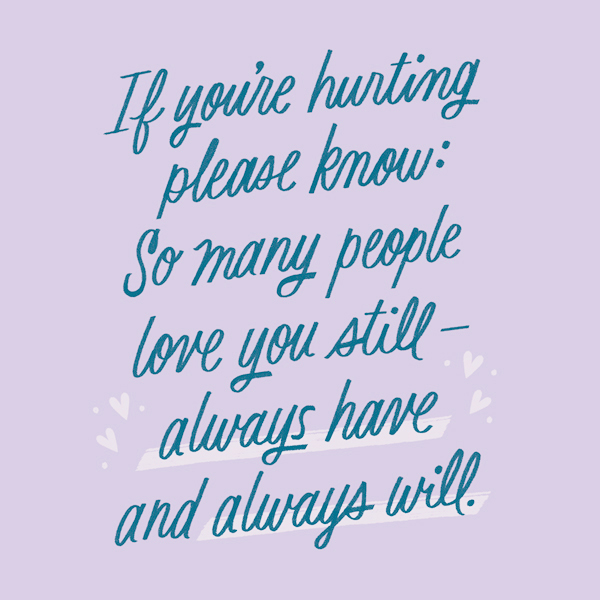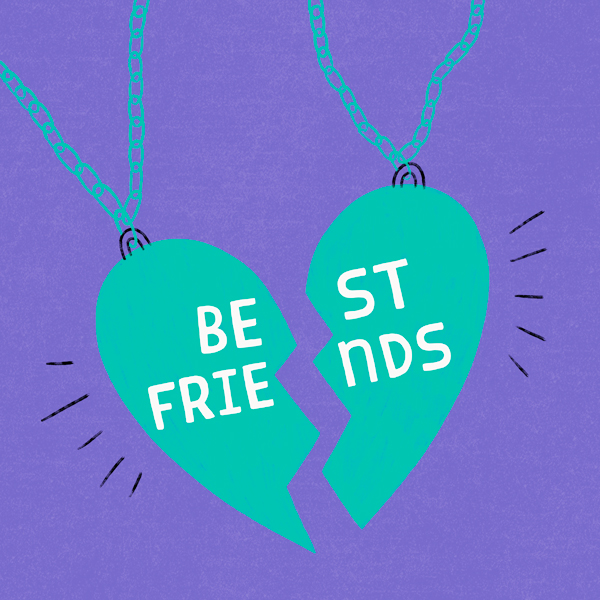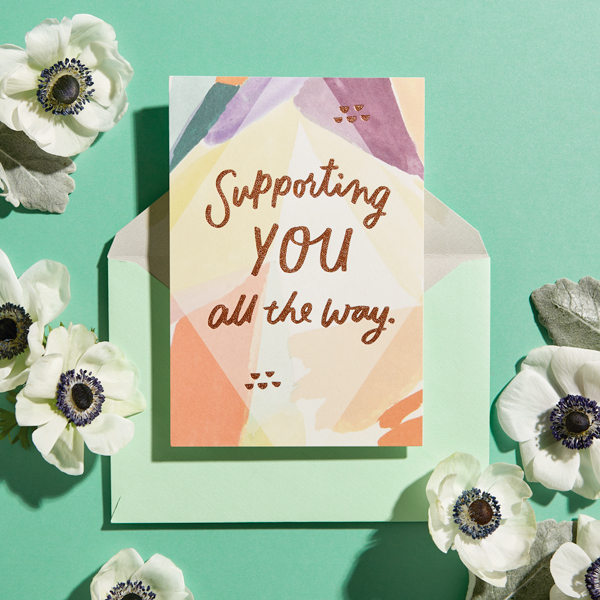Grief support: How to help someone who is grieving immediately after a loss

When a friend suffers the loss of a loved one, their whole life changes. And we wonder: What can we do to help someone who is grieving a death? What can we say and do to offer comfort and ease their pain?
Even if you’ve suffered a similar loss, the person you’re missing is not the person your friend is missing. The memories you’ve made are different from theirs. The story of you is wildly different from your friend’s story.
But there are some universal experiences and emotions that can help us support a friend through bereavement. Those of us who’ve been a part of the grief caravan for a while have learned a little about what to do and say to help a hurting friend.
We’ve broken our advice into three parts:
- How to Help Someone Who is Grieving Immediately after a Loss
- Continuing Grief Support: How to Help Someone Who is Grieving over Time
- Grief Support on Anniversaries, Birthdays and Special Occasions
Inspired? Create and share by tagging @Hallmark.
How to express sympathy when someone dies
If we were to call this How to Support a Grieving Friend 101, our first lesson would be, “Say something.”
Acknowledging your friend’s loss is the first step in being supportive and offering comfort. You can do this in various ways, from a card to a phone call to kind condolences on social media. It can even be a hug followed by a big “I care about you.”
Be sincere and be yourself, and your friend will see that. And if you’re afraid you’ll say the wrong thing, try not to worry: It’s better to reach out with warm words than to not say anything at all.
What to say
What we say and don’t say does make a difference. So, if you find yourself feeling anxious or uncomfortable, keep it simple:
- I’m so sorry.
- You’ve been on my mind.
- I’m keeping you and your family close in my heart.
- Your mama was a truly incredible person.
- John will be missed.
- I thought the world of your dad. He was a great guy.
- I love you, Friend.
What to avoid
Watch out for platitudes—You know, the things that may sound wise but don’t actually help:
- She’s in a better place. This sentiment seems comforting to say, but selfishly we all just want our loved ones with us.
- God needed more angels in heaven. Maybe your friend is spiritual, but it’s always good to be sensitive about sharing your thoughts on God’s plan.
- Your pain will heal over time. There probably will be better days. But when someone we love dies, the grief of our loss always lives within us, even when we feel happy—sometimes especially when we feel happy.
- Everything happens for a reason. No one knows the reason bad things happen, and it’s usually hard to recognize meaning directly after an excruciating loss.
- At least you had many years together. Or anything that starts with “At least…”
- If I were you, I’d go to therapy. Your grieving friend needs love right now. Not advice.
- I know exactly how you feel. Remember, your stories are different—and it’s not helpful to share them with someone freshly experiencing loss.
Helpful Tip: If you won’t see your friend right away, here are some tips on what to write in a sympathy card. Even if you are able to attend a funeral or celebration of life, a card is a tangible way to offer comfort.
What to say in social media to comfort a grieving friend
Twenty years ago or so, we didn’t post condolences on friends’ social media newsfeeds. But things have changed. Responding online to a recent death can be a wonderful gift to your friend; it’s immediate and can get a caring message across as things are unfolding.
Just remember to use good judgment when posting a message everyone can see. If you’re nervous, ask one of your intuitive friends if your thoughts are okay to post.
What to say
Here are a few simple tips for online condolences after a loss:
- Share a fond memory of the person—or what you know about them through your friend’s eyes. Make sure you don’t reveal anything too personal that might be embarrassing or uncomfortable.
- Speak directly to the person who’s passed on their social media account:
o We miss you, Friend.
o You’re in our hearts.
o We’ll never forget you.
o We love you.
o Or make it more personal: Bet you’re singing your heart out up there.
o Or tell a story or share a memory. - Post photos, including some of you together or snapshots family members may not have seen.
- Offer warm messages of comfort like:
o I’m thinking of you.
o I’m really, really sorry.
o Your sister was a friend to us all.
o Your family is special to me and I want you to know I care.
o You and everyone who loved your uncle are in my prayers.
o You’ve been such an awesome pawrent to Sophie. And she was such an awesome furbaby.
What to avoid
Before you post anything—on your feed, your friends’, or the person who has passed—make sure you’re not talking out of turn. Unless you’ve specifically been asked to announce the sad news, don’t be the first one to comment publicly. The family may have more difficult phone calls to make to their inner circle before delivering a sad message online.
When you do comment, remember:
- Don’t make it about you or your grief. Maybe you can’t sleep. Maybe you’ve been crying for days. BUT the family needs the most sympathy and empathy at this time.
- Think of everyone who might read your post: A parent. A grandparent. The pastor of their church. (Note: Pastors do view social media posts to get a sense of the person who passed in order to give a funeral tribute.) Then keep your comments appropriate. For example, this may not be the best place for excessive cursing or stories that would make others blush.
- Post photos everyone would be proud of. A few what-not-to-post ideas might include a controversial ex-spouse, a terrible boss, or a pic you know they wouldn’t have posted themselves.
Ways to offer your support for a grieving friend
After you’ve sent a card or checked in with your friend, you may wonder, how else can I help? A death in the family can change so many things—daily routines, financial circumstances, even living situations. There are a lot of major tasks to tackle, like making funeral arrangements and contacting relatives and friends.
Your friend most likely would love your support, but how do you know what’s appropriate? How do you know how to be helpful without imposing or making more work?
It may feel thoughtful to keep things open-ended by saying, “Let me know if you need anything!” or “Call me if I can help!” But immediately following a loss, people can be numb and overwhelmed—or hesitant to ask for the things they really need.
Make it easier for them by being proactive: Offer specific help and keep offering.
What you can do to help in the days and weeks after a death
Be there for your grieving friend by thinking about who they are, how they live, and what kinds of responsibilities you could take off their plate. Make a list of things you could do and offer to take care of some of them. Maybe it looks like this:
- Pick up groceries
- Do some errands
- Drop off dinner at the house
- Take care of kids or pets
- Take care of yard work
- Call to chat
- Help sort mail
- Pull in garbage cans from the street on trash day
- Help load up the car with flowers and gifts from the funeral home
- Turn photos they provide into a slideshow or display for the memorial service
- Address thank-you notes after the funeral
You may be thinking, “My friend and I are just pals through book club. We’re not very close.” Sometimes though, the “outer circle” friends are the ones who really step up the caring.
Here are some very touching things you can do if you don’t feel close enough to know what their day-to-day needs might be:
- Sponsor the floral arrangement at church during Sunday worship
- Donate or volunteer for their favorite charity—a food drive, a community improvement project, an animal shelter
- Drop off a loved one’s favorite candy or snacks
- Coordinate or sign up for a meal train to deliver food (here are some comforting recipes we recommend)
- Organize a card shower to fill their mailbox with supportive messages
- Name a star after them
How to figure out what your friend needs
How else can you find out what your grieving friend needs and reach out? Think about what you know of her behavior and relationships, and let that be your guide:
- Is your friend an introvert or a homebody? Does she need her alone time after a long day? Instead of calling or dropping by, gather a basket full of comforting items and leave it at her door or on the porch with a note or send a care package by mail.
- Does she thrive when surrounded by her closest confidantes? Has laughter always made things a bit better for her? Schedule some time together. It’s possible she could use a mini mental break from the weight of her heartache. But, take note—this doesn’t mean she won’t be grieving the entire time. Take cues from her about the conversation: Does she want to be distracted or to tell stories about her loved one?
- How has your friend supported others who were having a rough time? What are some caring things she’s done or likes to do? If she bakes for stressed-out friends, maybe tell her you’re there for her with a beautiful box of cupcakes. If she’s the one you call when you’re stranded at the airport, then why not ask her for her grocery list and shop for her or have it delivered. If she’s always the one who lets you rant about your bad day, be available for her, even if you’re swamped.
Author and pastor Gary Chapman was definitely onto something when he wrote about the different ways we give and receive love in The 5 Love Languages.
Because we all share and accept love differently, pay attention to what might make the most positive impact in your friend’s grief journey.
When to check back in
In the first days and weeks after someone close passes, they’ll be reentering their lives, going back to work, and returning to their routines. This is the time for check-ins—notes, cards, calls or texts, and thoughtful gestures that say, “You’re still in our thoughts.”
A few we recommend:
- Dropping off carryout from their favorite restaurant
- A gift card from a group of friends for whatever they find relaxing: books, movies, spa treatments, art supplies
- A personalized memory stone for the garden
- A donation in their loved one’s memory
- A playlist of soothing music
- A box of fresh-off-the-line doughnuts
- Flowers from your garden or a pretty arrangement from the farmer’s market
Saying we care then backing it up by showing we care can be a very powerful balm for someone immersed in bereavement. Just do your best and keep being your empathetic, thoughtful self.
If you feel uncertain, think about what would bring a moment of peace to your heart, and we bet you’ll find the answer. One thing we do know for sure? The smallest act of kindness is never really small when done with love.
Next, read about ways to be there for a friend during the first year after a loss.
Helpful Tip: Seeking out a variety of reading material on loss by grief experts, authors of memoirs and bloggers who share their own perspective can help prepare you to support a grieving friend and cope with your own grief. Another resource on grieving that we recommend is “ABCs of Healthy Grieving: A Companion for Everyday Coping” by thanatologist and grief educator Harold Ivan Smith.
Shop Sympathy
See allYou may also like
See more-
Sympathy How to support a grieving friend
Advice on how to support a grieving friend, directly from people who went through it. Get ideas to show you care here.
-
Sympathy Sympathy gift ideas for offering your condolences and support
Many times, we don’t know what to say after a loss. It can be difficult to determine what will comfort a hurting frie...
-
Sympathy 75+ grief quotes to give you comfort and help you heal
Grieving the loss of a loved one feels different for everyone, and there’s no telling what will bring comfort on a ha...
-
Valentine's Day Ways to find comfort and hope when you’re grieving on Valentine’s Day (or support someone who is)
Grief is always hard, but especially on Valentine’s Day. From social media to stores to kids’ classrooms, it can feel...
-
Valentine's Day How to survive Valentine’s Day after a divorce or breakup
We know that ending a relationship can be extremely heartbreaking. It’s a very significant loss, and when Valentine’s...
-
Mother's Day Mother's Day without Mom: Remembering lost loved ones with new traditions
This Mother’s Day will be my third without my mom. She died just before Thanksgiving and Christmas in 2020, which mad...
-
Lifestyle How to Write an Obituary: What to Say About the Life of a Loved One
Summarizing a loved one’s life can feel like an impossible task, especially when you’re grieving. It’s even more chal...
-
Card Ideas What to Say When Someone Loses a Pet
My first cat died when I was 8 years old. His name was Barnabus—after the soap opera vampire—and he was a handsome bl...
-
Friends How to survive a friendship breakup
There are a few things that I dreamed of having more than anything as a kid—like a golden retriever, my own room, mer...
-
Christmas A Christmas tribute: meaningful ways to weave memories of lost loved ones into new holiday traditions
For many of us, Christmas is the time of year when we miss our lost loved ones the most. Finding ways to memoriali...
-
Sympathy Sympathy messages: What to write in a sympathy card
Signing a sympathy card isn’t easy. We search for words. We wonder what would be comforting to hear. We worry about s...
-
Sympathy Grief and the holidays: Supporting friends through difficult days
Many of our favorite holiday memories include family members and our closest friends. So it’s no surprise that people...
-
Baby What to Say When a Friend Loses a Baby: Messages of Love and Support
Losing a baby, no matter how it happens—or how early in the pregnancy—is devastating. It’s a time of sadness when ...
-
Sympathy How to Grieve Together When You Can’t Be Together
When someone has died, our first instinct is to rally around the family and friends closest to the deceased, offer...
-
Sympathy Continuing Grief Support: How to Help Someone Who is Grieving over Time
Grief doesn’t follow a schedule. There’s no deadline for the feelings of sadness, anger and loneliness to subside ...
-
Sympathy Grief support on anniversaries, birthdays and special occasions
When you’re supporting a friend through their grief, look to the calendar for cues about when they might need extr...
-
Sympathy Hospice Messages: What to Write to Someone Who is Dying
The end of a person’s life is an important time for friends and family members to reach out with words of caring, ...
-
Mother's Day When Mother’s Day Is Hard: Giving Support to Those Who Are Hurting
Mother’s Day can be hard for many people, from mothers who’ve lost children and children who’ve lost mothers to th...
-
Sympathy Grief and loss: how to comfort the grieving
The sympathy cards have been safely tucked away. The flowers have been careful...




















